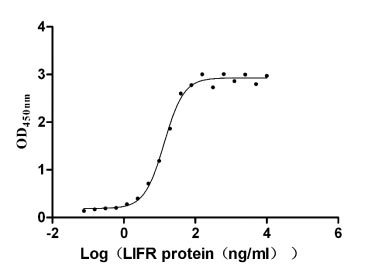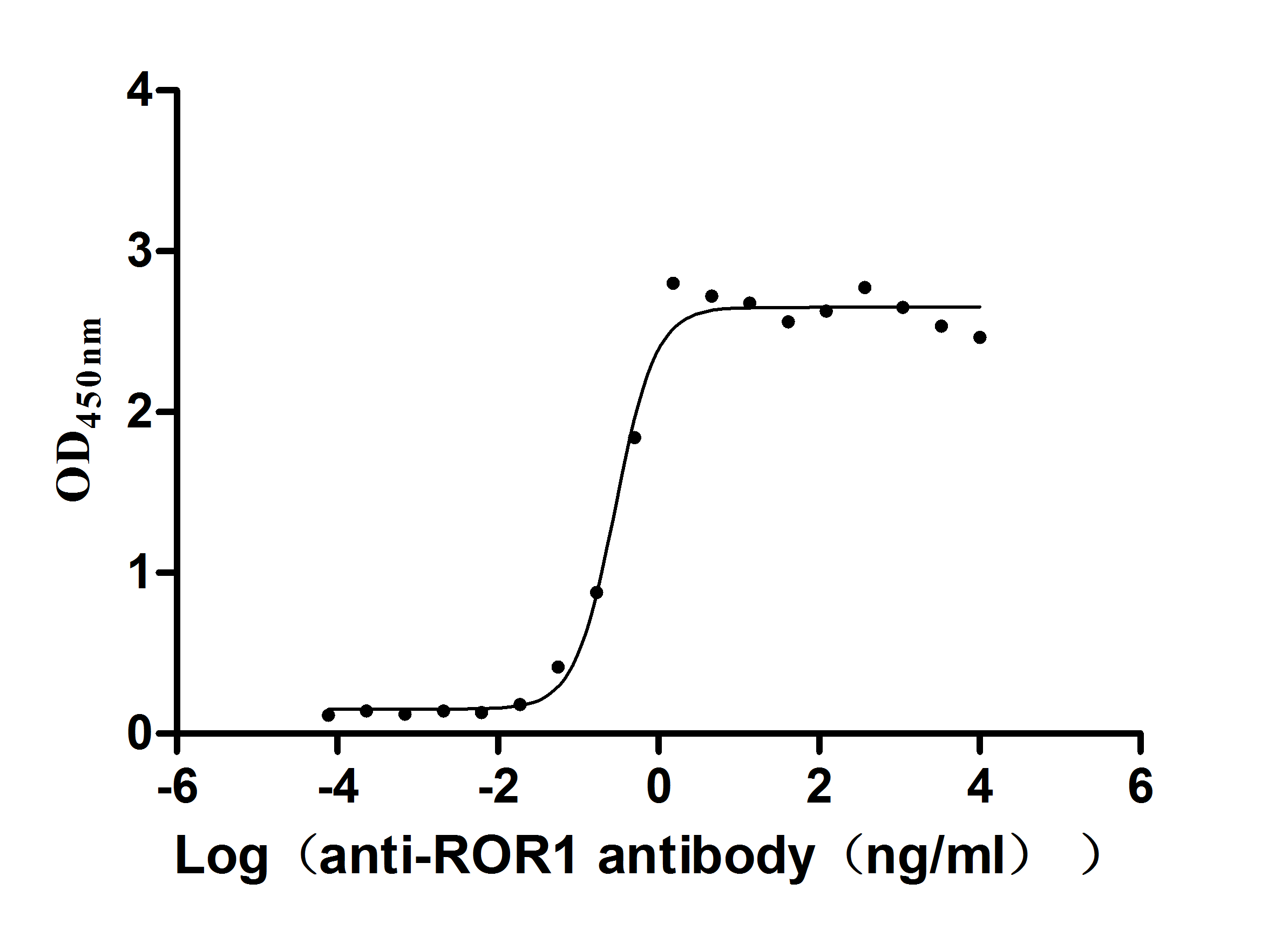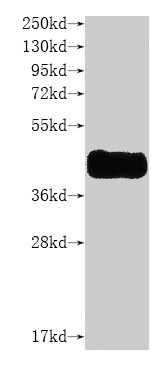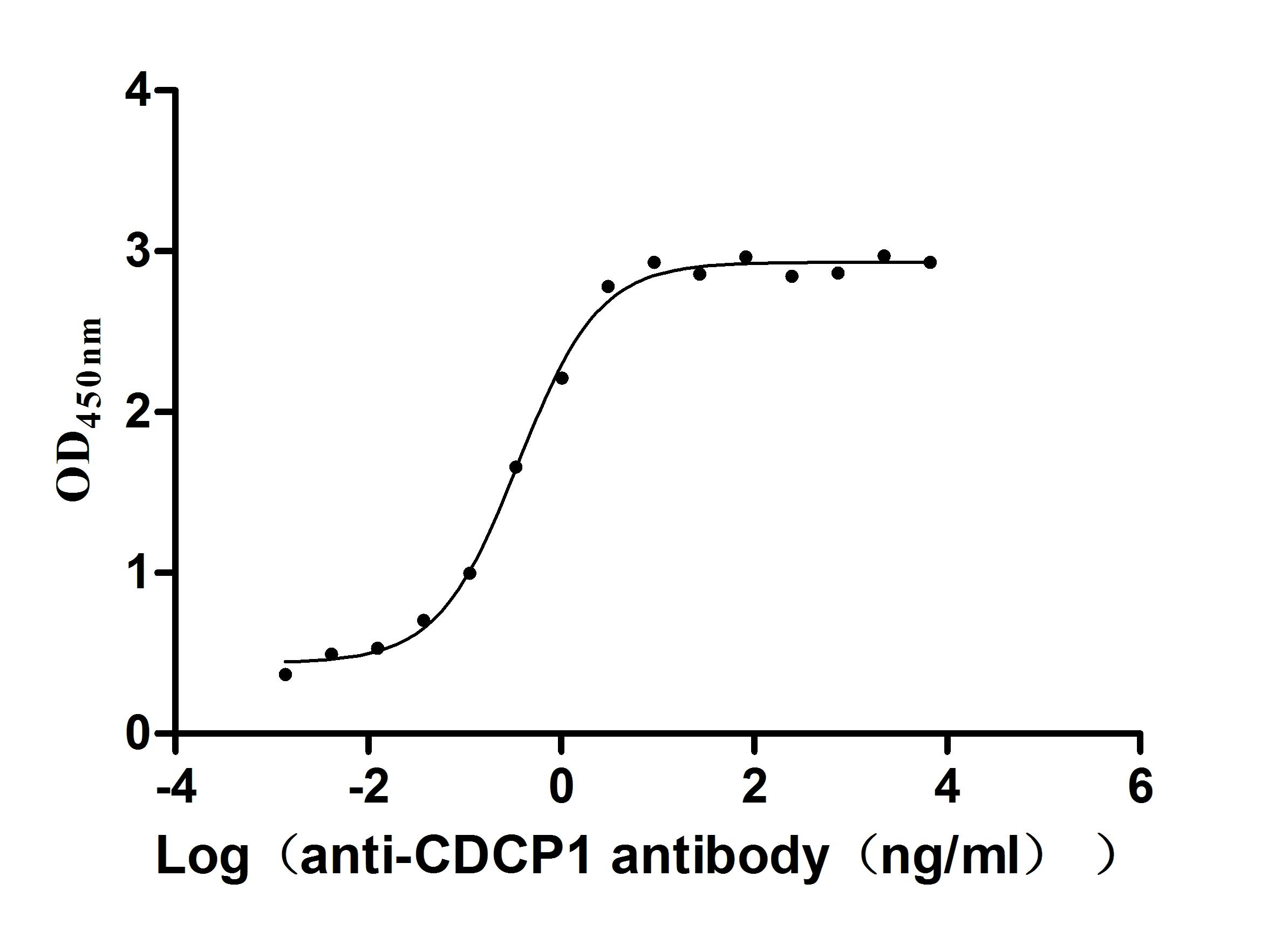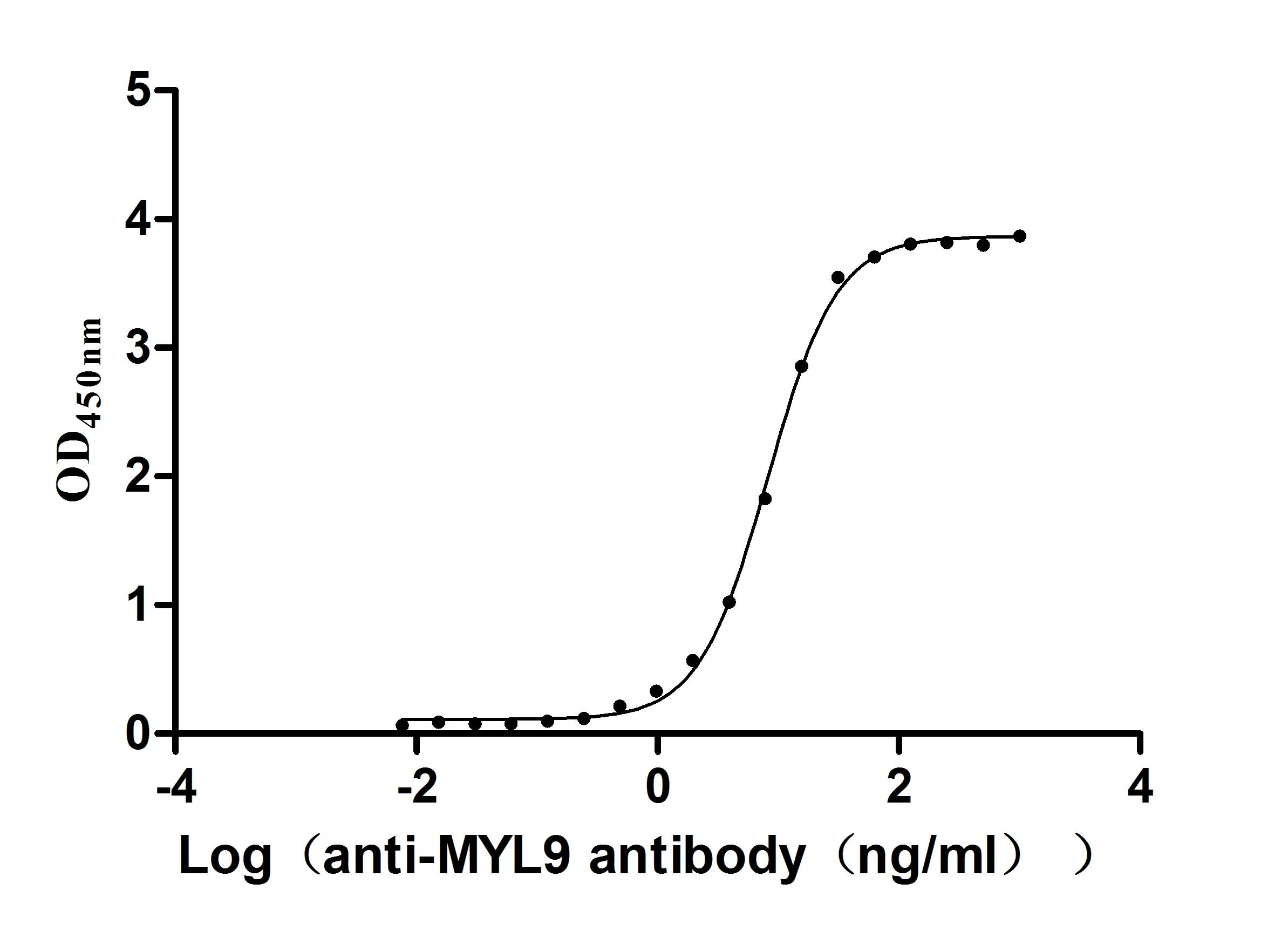Recombinant Human Adenosine receptor A2b (ADORA2B)
-
货号:CSB-CF001377HU
-
规格:
-
来源:in vitro E.coli expression system
-
其他:
产品详情
-
基因名:
-
Uniprot No.:
-
别名:ADORA2B; Adenosine receptor A2b
-
种属:Homo sapiens (Human)
-
蛋白长度:Full length protein
-
表达区域:1-332
-
氨基酸序列MLLETQDALYVALELVIAALSVAGNVLVCAAVGTANTLQTPTNYFLVSLAAADVAVGLFA IPFAITISLGFCTDFYGCLFLACFVLVLTQSSIFSLLAVAVDRYLAICVPLRYKSLVTGT RARGVIAVLWVLAFGIGLTPFLGWNSKDSATNNCTEPWDGTTNESCCLVKCLFENVVPMS YMVYFNFFGCVLPPLLIMLVIYIKIFLVACRQLQRTELMDHSRTTLQREIHAAKSLAMIV GIFALCWLPVHAVNCVTLFQPAQGKNKPKWAMNMAILLSHANSVVNPIVYAYRNRDFRYT FHKIISRYLLCQADVKSGNGQAGVQPALGVGL
Note: The complete sequence including tag sequence, target protein sequence and linker sequence could be provided upon request. -
蛋白标签:N-terminal 10xHis-tagged
-
产品提供形式:Liquid or Lyophilized powder
Note: We will preferentially ship the format that we have in stock, however, if you have any special requirement for the format, please remark your requirement when placing the order, we will prepare according to your demand. -
缓冲液:Lyophilized from Tris/PBS-based buffer, 6% Trehalose, pH 8.0
-
储存条件:Store at -20°C/-80°C upon receipt, aliquoting is necessary for mutiple use. Avoid repeated freeze-thaw cycles.
-
保质期:The shelf life is related to many factors, storage state, buffer ingredients, storage temperature and the stability of the protein itself.
Generally, the shelf life of liquid form is 6 months at -20°C/-80°C. The shelf life of lyophilized form is 12 months at -20°C/-80°C. -
货期:Basically, we can dispatch the products out in 1-3 working days after receiving your orders. Delivery time may differ from different purchasing way or location, please kindly consult your local distributors for specific delivery time.Note: All of our proteins are default shipped with normal blue ice packs, if you request to ship with dry ice, please communicate with us in advance and extra fees will be charged.
-
注意事项:Repeated freezing and thawing is not recommended. Store working aliquots at 4°C for up to one week.
-
Datasheet & COA:Please contact us to get it.
相关产品
靶点详情
-
功能:Receptor for adenosine. The activity of this receptor is mediated by G proteins which activate adenylyl cyclase.
-
基因功能参考文献:
- CD73-depedent elevation of plasma adenosine signaling via ADORA2B-mediated protein kinase A phosphorylation, ubiquitination and proteasome degradation of erythrocyte ENT1 is a novel feed-forward signaling network underlying initial hypoxic adaptation and retention upon re-exposure. PMID: 28169986
- hypoxia increased expression of adenosine receptor 2B (A2BR) in human breast cancer cells through the transcriptional activity of hypoxia-inducible factor 1. PMID: 30242135
- findings suggest that hypoxia, through HIF1A, contributes to the development and progression of pulmonary fibrosis through its regulation of ADORA2B expression on alternatively activated macrophages, cell differentiation, and production of profibrotic mediators PMID: 28701304
- The A2b adenosine receptor antagonist PSB-603 promotes oxidative phosphorylation and ROS production in colorectal cancer cells via adenosine receptor-independent mechanism. PMID: 27693637
- the effects of TNF-alpha were investigated on the expression/responsiveness of the A2B adenosine receptor (A2BAR), a Gs-coupled receptor that promotes mesenchymal stem cell (MSC) differentiation into osteoblasts. PMID: 28137910
- cells lacking A2b do not respond in this manner to hypoxia or ATP but transfection of A2b restores this response, that Epac1 is critically involved, and that Rap1B is important for the relative positioning of the centrosome and nucleus. PMID: 27226580
- Studies show that A2b receptor is overexpressed in various tumor lines and biopsies from patients with different cancers. This suggests that A2b receptor can be used by tumor cells to promote progression. [review] PMID: 27729268
- Findings suggest that, in obese status, the lower expression level of A2bAR, KLF4, and KLF15 of visceral adipose tissue may correlate with obese-dyslipidemia induced inflammation in Uygur population. PMID: 27199507
- erythrocyte AMP-activated protein kinase was activated in humans at high altitude. It is a key protein functioning downstream of the A2B adenosine receptor, phosphorylating and activating BPG mutase and thus inducing 2,3-BPG production and O2 release from erythrocytes. PMID: 27482003
- A2B receptor activation is critically required for the stimulatory effect of adenosine on IL-10 production and suppression of nitric oxide release. PMID: 26748211
- Data show that ADORA2B mRNA and protein were significantly up-regulated in oral squamous cell carcinoma (OSCC) and that ADORA2B controls cellular proliferation via HIF-1alpha activation, suggesting it may be a key regulator of tumoral progression in OSCCs. PMID: 26228921
- ADORA2B is a target gene of miR-128b.MiR-128b represses cell proliferation, migration and invasion and promotes apoptosis by targeting ADORA2B in gastric cancer. PMID: 26478435
- the A2B AR activation-driven angiogenesis via cAMP-PKA-CREB mediates VEGF production and PI3K/AKT-dependent upregulation of eNOS in HMEC-1 PMID: 25966978
- The rs7208480 of ADORA2B as well as the haplotypes were not found to be associated with chronic heart failure susceptibility. PMID: 25629231
- our data suggest that adenosine A2b signaling represses CIITA transcription in VSMCs by manipulating the interaction between STAT1 and the epigenetic machinery. PMID: 25765819
- After myocardial infarction, A2B receptor signaling regulates myocardial repair and remodeling. PMID: 24584483
- Activation of the adenosine A2B receptor is regulated by the C-terminus of G protein alpha-subunits. PMID: 24464644
- the adenosine A2b receptor was shown to be the only one of the adenosine receptors whose cardiac expression is induced by ischemia in both mice and humans and whose function is implicated in ischemic pre- or post-conditioning PMID: 24502579
- A2B receptor activation blunts trophoblast migration possibly as a result of reduced activation of the MAPK signaling pathway and lower proMMP-2 levels. PMID: 25002363
- the A2B adenosine receptor (ADORA2B) is essential for adenosine-induced SphK1 activity in human and mouse normal and sickle erythrocytes in vitro PMID: 25587035
- Findings support a potentially destructive role for A2BAR under intestinal ischemia/reperfusion and acute hypoxic conditions. PMID: 24966910
- study implicates the A2bAR as a regulator of adipocyte differentiation and the A2bAR-KLF4 axis as a potentially significant modulator of adipose biology. PMID: 24928509
- HUVECs from preeclampsia exhibit elevated protein level of A2BAR and impairment of A2BAR-mediated NO/VEGF signaling pathway. PMID: 24877077
- Data indicate adenosine receptor ADORA2B as the specific receptor and signalling pathway for the metabolite 5'-methylthioadenosine (MTA). PMID: 25087184
- High concentrations of extracellular adenosine in the tumor microenvironment can chronically activate A2B receptors to suppress Rap1B prenylation and signaling at the cell membrane, resulting in reduced cell-cell contact and promoting cell scattering. PMID: 23716716
- ADORA2B was induced in lung cells after cyclic mechanical stress. A prominent region within the ADORA2B promoter conveys stretch responsiveness and has a binding site for HIF-1. PMID: 24391213
- an important role of the A2B receptor-dependent upregulation of JunB in VEGF production and possibly other AP-1-regulated events. PMID: 24136993
- increased expression levels of the adenosine A2B receptor and a heightened deposition of hyaluronan (a component of the extracellular matrix) in remodeled vessels of patients with pulmonary hypertension associated with COPD PMID: 23855769
- Hypoxia induced serotonin synthesis and secretion is amplified by ADORA2B signaling via MAPK/CREB and TPH-1 activation. PMID: 23638125
- CD73 promotes the production of renal adenosine that is a prominent driver of renal hypertension by enhanced ADORA2B signaling-mediated endothelin-1 induction in a hypoxia-inducible factor-alpha-dependent manner. PMID: 23584256
- A2B receptors are expressed in neuroendocrine tumors during cellular stress, damage and hypoxia. PMID: 22119961
- The most recent evidence concerning the role of ADORA2B and its potential therapeutic relevance is discussed. [Review Article] PMID: 22963436
- Identification of a pharmacologically tractable Fra-1/ADORA2B axis promoting breast cancer metastasis. PMID: 23483055
- Binding of A(2B)AR to specific sites on p105 prevents polyubiquitylation and degradation of p105 protein. PMID: 22767505
- study identified the A2bAR as a significant regulator of HFD-induced hallmarks of T2D, thereby pointing to its therapeutic potential. PMID: 22848385
- Distinct interactions of structurally diverse ligands with the human A(2B) receptor and differences between closely related receptor subtypes. PMID: 23286920
- A(2B)ARs mediate C. difficile toxin-induced enteritis and disease. PMID: 23045479
- ADORA2B is a candidate gene known to modify the severity of sickle cell disease. PMID: 22679008
- A(1) and A(2B)adenosine receptors could be potential biomarkers to provide an early indication of SA risk and their stimulation may turn out to improve fetoplacental perfusion by increasing vascular endothelial growth factor (VEGF) and nitric oxide (NO). PMID: 22867902
- [review] There is evidence that the ADORA2B receptor has cardioprotective effects upon its activation. However, controversy remains regarding the precise timing of activation required to induce cardioprotection. PMID: 21335481
- adenosine stimulates human endothelial progenitor cells migration by activating A2A and A, but not A2B, receptors and provides evidence to support a role of adenosine in modulating angiogenic capacity of hEPC PMID: 22217884
- studies identify adenosine-elicited stabilization of Per2 in the control of HIF-dependent cardiac metabolism and ischemia tolerance and implicate Per2 stabilization PMID: 22504483
- 2',3'-cAMP inhibits proliferation of vascular smooth muscle cells from the aorta and coronary arteries. This effect is due in part to metabolism of 2',3'-cAMP to adenosine, with engagement of the A2B receptor. PMID: 21622827
- Only the disulfide bond of the adenosine A2B receptor is essential for ligand binding and receptor activation. PMID: 21620804
- The main differences between the general dynamic behaviors of the A(2A)AR receptors and A(2B)AR receptors explored can be explained in terms of their particular sequences, loops lengths, and disulfide bridges. PMID: 21480628
- Adenosine A(B) receptors mediate an early induction of NR4A1 and a decrease in cell proliferation via the cAMP/Epac pathway in coronary artery smooth muscle cells. PMID: 21109603
- The ability of transgenic A2BR blockade to reduce circulating interleukin (IL)-6 levels by 24 hr may be explained by the reduction of bacterial load, and reflects that transgenic mice are going to live. PMID: 21242513
- The results of this study suggest that deterioration of structure in the extracellular domains of GPCRs compromises overall receptor structure with profound consequences for receptor activation and constitutive activity. PMID: 21030693
- ADORA2B was overexpressed in colorectal carcinomas grown under a hypoxic state, presumably promoting cancer cell growth. PMID: 20619442
- TNF-alpha-induced A(2B)AR expression in colonic epithelial cells is post-transcriptionally regulated by miR27b and miR128a PMID: 20388705
显示更多
收起更多
-
亚细胞定位:Cell membrane; Multi-pass membrane protein.
-
蛋白家族:G-protein coupled receptor 1 family
-
数据库链接:
HGNC: 264
OMIM: 600446
KEGG: hsa:136
STRING: 9606.ENSP00000304501
UniGene: Hs.167046
Most popular with customers
-
Recombinant Human Leukemia inhibitory factor receptor (LIFR), partial (Active)
Express system: Mammalian cell
Species: Homo sapiens (Human)
-
Express system: Mammalian cell
Species: Homo sapiens (Human)
-
Recombinant Human C-C chemokine receptor type 8 (CCR8)-VLPs (Active)
Express system: Mammalian cell
Species: Homo sapiens (Human)
-
Recombinant Human CUB domain-containing protein 1 (CDCP1), partial (Active)
Express system: Mammalian cell
Species: Homo sapiens (Human)
-
Recombinant Human Myosin regulatory light chain 12B(MYL12B) (Active)
Express system: E.coli
Species: Homo sapiens (Human)


